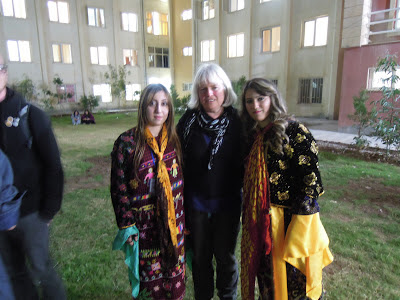On this day I told Nishtiman that I wanted to see her mother. N. told me that I could go there but she could not, as she was busy with the festival. That meant that I was on my own for language. That felt OK. I had the Kurdish in my head and my trusty dictionary, along with a lot of patience on the family's part and mine.
So, over I went. First there was a bit of confusion because they were setting down to eat breakfast and I had already eaten and could not manage another bite. Once that was settled everyone around the tablecloth on the floor seemed to decide that it would be a great idea for me to have a shower. Now, this was great news for me but I chuckled to think that this was a universal agreement. When I was done I was congratulated-'Perozbet". I did not really understand why I was been given the word that one receives on holidays, birthdays and births. But I think they liked a clean me and I did too so all was good!!
Nishtiman came home for lunch and told me before she left that the family was headiing out for a picnic with "hanar/pomegranates. I did not really undersstand what that meant. Usually picnics have coal burners with chicken on sticks and dolma. But I was game and picnics are fun.So we all piled into two cars. I was given the seat of honour beside the driver (son-in-law Asaad) while everyone else doubled up in the back seat. I tried to get the young grand daugher to share my seat, but either that is forbidden by traffic laws, or they did not want to disturb my comfort.
We drove out into the mountains. Ranya is at the foot of the Black Mountains (they look black when they are wet), but I don't know which mountains these were. We began to encounter tiny villages and more animals and people waving at us as we passed. Occasionally the cars would slow to honk at people working in the yards and they would greet the family.
Pomegranates hanging from the trees. It sure is different than paying $1.50 for one in Canada.
The family gathers and gets ready to pick fruit
Elea fell asleep on the journey in the car, so this is her comfy bed for her nap. I think her family shared my opinion that she looked like "sleeping beauty" so they placed a bit of pomegranate by her head.
Strategies to get the fruit from the tallest trees; pulling and holding tall branches and using sticks to knock them down.
And further strategies for getting walnuts out of the tall, tall tree. This is son, Dilzar.
I stuffed myself full with pomegranates and beautiful ripe, purple figs.
Grandson (I think his name is Rebaz).
On the way back to the car. I am not sure what Gul was doing, but when she looked at the photo she thought that she looked like the queen.
Gul, sister to Gul's husband, Razhan (daughter in law), Sharaban (daughter), me, Ranya (grand daughter) and Rebaz (grandson)
Grandson (I think his name is Rebaz).
On the way back to the car. I am not sure what Gul was doing, but when she looked at the photo she thought that she looked like the queen.
Gul, sister to Gul's husband, Razhan (daughter in law), Sharaban (daughter), me, Ranya (grand daughter) and Rebaz (grandson)
Asaad, Gul's son in law and husband of Pari. He drove me around to show me the spring for the village and to see some of the tiny villages in the area. As he took my photo in this spot he said, "you know what this is?" I surprised him by saying that it was a gravestone. A old gravestone, but it may be from the time of Sadaam's anihlation of the villages. His family left the farm with the pomogranates 20 years ago.









